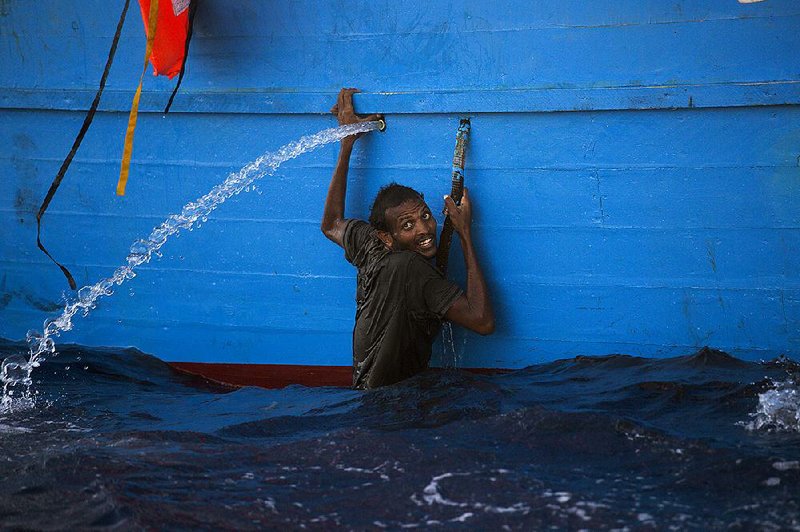OFF THE COAST OF LIBYA -- Italian naval ships and vessels from nongovernment groups rescued thousands of migrants off the Libyan coast Monday, the latest surge in attempts to flee to Europe driven by war, poverty, and human traffickers.
The operation took place just 13 miles north of the town of Sabratha in Libya. Groups such as Proactiva Open Arms and Doctors Without Borders helped take on about 3,000 people who had been traveling in some 20 small wooden boats.
In images and video, migrants from Eritrea and Somalia are seen cheering as the rescue boats arrive, with some jumping into the water and swimming toward them while others carefully carry babies onto the rescue ships.
Their boats too weak and technically unequipped for a voyage across the stretch of the Mediterranean to the shores of Italy, the migrants had set off with a bit of gasoline in the overcrowded vessels, hoping to make it at least 15-20 miles out to sea and reach awaiting rescuers.
Tens of thousands of Africans each year take the dangerous Mediterranean Sea route as a gateway to a better life in Europe, alongside those fleeing wars and conflicts from Syria to Afghanistan.
Libya's chaos and lack of border controls have made that country a transit route.
Since the 2011 ouster and killing of longtime Libyan dictator Moammar Gadhafi, the country has sunk into lawlessness, facing a myriad of militias vying for influence and an emerging affiliate of the Islamic State extremist group.
In June, the European Union expanded its anti-smuggling operation in the central Mediterranean to include training Libyan coastal and naval forces, which are intercepting boats and returning migrants to Libya, where some are being held in abusive conditions.
Rights groups and experts estimate that there are about 3,500 migrants held in roughly 20 official detention facilities across Libya.
Others are held in informal detention centers controlled by criminal gangs or armed groups.
As thousands were rescued, Poland's deputy foreign minister, Konrad Szymanski, said in an interview Monday on state-run Radio Three that German Chancellor Angela Merkel is wrong to criticize EU partners who are refusing to give protection to Muslim refugees.
Szymanski said countries such as Poland that reject EU-negotiated refugee quotas are in line with the public mood.
Szymanski was responding to Merkel's criticism of EU countries, particularly in Central and Eastern Europe, that have rebuffed EU plans to share responsibility for migrants across the 28-nation bloc.
"I believe it is harmful to Europe and is already bringing far-reaching opposition," he said, adding that such views were common in Western Europe as well.
He singled out Germany and the Netherlands, saying that people there "feel less and less safe."
Szymanski said forcing migrant quotas on EU nations violates their right to decide their own national policies and threatens European integration.
Last week Merkel discussed migration issues with the leaders of Poland, Hungary, the Czech Republic and Slovakia -- nations that are protesting the EU refugee quota system.
A Sept. 16 EU summit is to discuss immigration, among other themes.
A private foundation brought some 300 Syrian Christians to Poland last year, but most have since left for Germany.
Poland insists the EU should do more to stop the wars and conflicts that are the sources of migration.
It urges more humanitarian aid sent to refugees in camps in Turkey, hoping they can return home when the situation allows.
Last year Poland committed to accepting 10,000 refugees, but it backed out after terror attacks in Paris and Brussels, citing security concerns.
Information for this article was contributed by staff members of The Associated Press.
A Section on 08/30/2016

